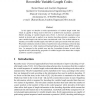Free Online Productivity Tools
i2Speak
i2Symbol
i2OCR
iTex2Img
iWeb2Print
iWeb2Shot
i2Type
iPdf2Split
iPdf2Merge
i2Bopomofo
i2Arabic
i2Style
i2Image
i2PDF
iLatex2Rtf
Sci2ools
DCC
2000
IEEE
2000
IEEE
Iterative Source/Channel-Decoding Using Reversible Variable Length Codes
In this paper we describe a trellis representation of variable length coded data which is capable of being used for bit-level or symbol-level maximum a posteriori (MAP) decoding of variable length codes (VLC). A bit-level soft-input/soft-output module is derived and is applied in an iterative decoding structure consisting of an outer variable length code and an inner convolutional code. Due to their inherent redundancy reversible variable length codes (RVLC) yield good results with this system. We present simulation results in terms of symbol error rate performance when the data is transmitted over a fully interleaved Rayleigh fading channel using BPSK modulation. As measure for the symbol error rate the Levenshtein distance is used which regards the self-synchronizing properties of variable length codes better than a simple symbol-by-symbol comparison.
Related Content
| Added | 30 Jul 2010 |
| Updated | 30 Jul 2010 |
| Type | Conference |
| Year | 2000 |
| Where | DCC |
| Authors | Rainer Bauer, Joachim Hagenauer |
Comments (0)

